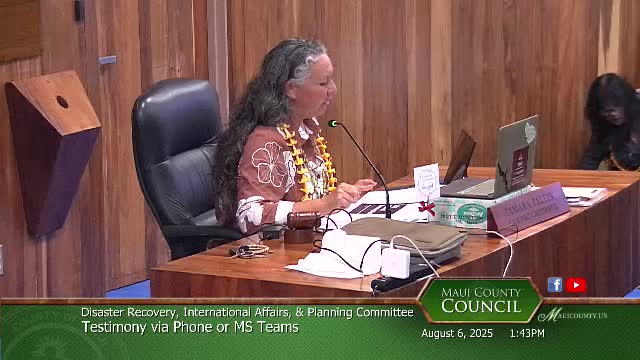Lahaina Community Land Trust Unveils Programs to Aid Housing Recovery After Wildfires
August 06, 2025 | Maui County, Hawaii
This article was created by AI summarizing key points discussed. AI makes mistakes, so for full details and context, please refer to the video of the full meeting. Please report any errors so we can fix them. Report an error »

Maui County officials are taking significant steps to support the recovery of Lahaina following the devastating fires, with a focus on housing stability and community resilience. During a recent government meeting, the Lahaina Community Land Trust presented its innovative "Keep Lahaina Home" program, designed to assist families facing insurance gaps and prevent displacement in the wake of the disaster.
The program aims to fill financial shortfalls for homeowners whose insurance does not cover the full cost of rebuilding. By providing financial assistance without taking ownership of the land, the initiative ensures that families can remain in their homes while committing to long-term affordability through deed restrictions. This approach not only helps families rebuild but also protects the community from the threat of gentrification and investor-driven land grabs.
The Land Trust's executive director, Autumn Ness, emphasized the urgency of the situation, noting that the housing crisis in Lahaina is not new, with roots tracing back to 1921. The program is designed to address both immediate needs and long-term sustainability, ensuring that Lahaina emerges from this disaster stronger than before.
In addition to the "Keep Lahaina Home" initiative, the Land Trust outlined two other pathways for recovery: traditional land acquisition and foreclosure intervention. These strategies aim to create a stable housing market that prioritizes local residents and prevents future displacement.
The meeting highlighted the collaborative efforts of various community organizations, including Hawaii Community Lending and Habitat for Humanity, which are working together to provide comprehensive support for affected families. By pooling resources and expertise, these partnerships are crucial in ensuring that Lahaina's recovery is equitable and sustainable.
As Lahaina continues to rebuild, the focus remains on creating a community where families can thrive without the fear of being priced out of their homes. The Land Trust's commitment to preserving local ownership and fostering generational wealth is a hopeful sign for the future of Lahaina, as it seeks to redefine recovery in a way that prioritizes people over profits.
The program aims to fill financial shortfalls for homeowners whose insurance does not cover the full cost of rebuilding. By providing financial assistance without taking ownership of the land, the initiative ensures that families can remain in their homes while committing to long-term affordability through deed restrictions. This approach not only helps families rebuild but also protects the community from the threat of gentrification and investor-driven land grabs.
The Land Trust's executive director, Autumn Ness, emphasized the urgency of the situation, noting that the housing crisis in Lahaina is not new, with roots tracing back to 1921. The program is designed to address both immediate needs and long-term sustainability, ensuring that Lahaina emerges from this disaster stronger than before.
In addition to the "Keep Lahaina Home" initiative, the Land Trust outlined two other pathways for recovery: traditional land acquisition and foreclosure intervention. These strategies aim to create a stable housing market that prioritizes local residents and prevents future displacement.
The meeting highlighted the collaborative efforts of various community organizations, including Hawaii Community Lending and Habitat for Humanity, which are working together to provide comprehensive support for affected families. By pooling resources and expertise, these partnerships are crucial in ensuring that Lahaina's recovery is equitable and sustainable.
As Lahaina continues to rebuild, the focus remains on creating a community where families can thrive without the fear of being priced out of their homes. The Land Trust's commitment to preserving local ownership and fostering generational wealth is a hopeful sign for the future of Lahaina, as it seeks to redefine recovery in a way that prioritizes people over profits.
View full meeting
This article is based on a recent meeting—watch the full video and explore the complete transcript for deeper insights into the discussion.
View full meeting
